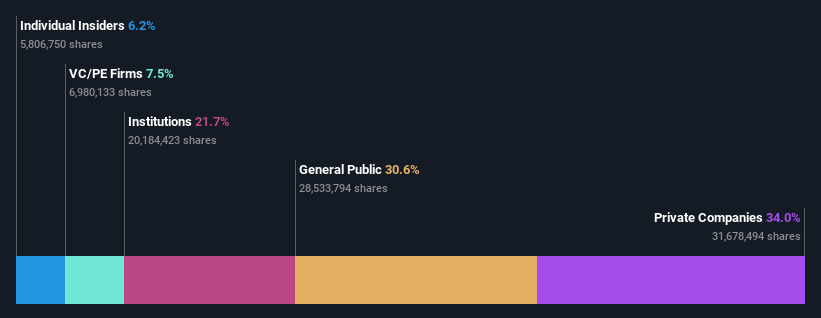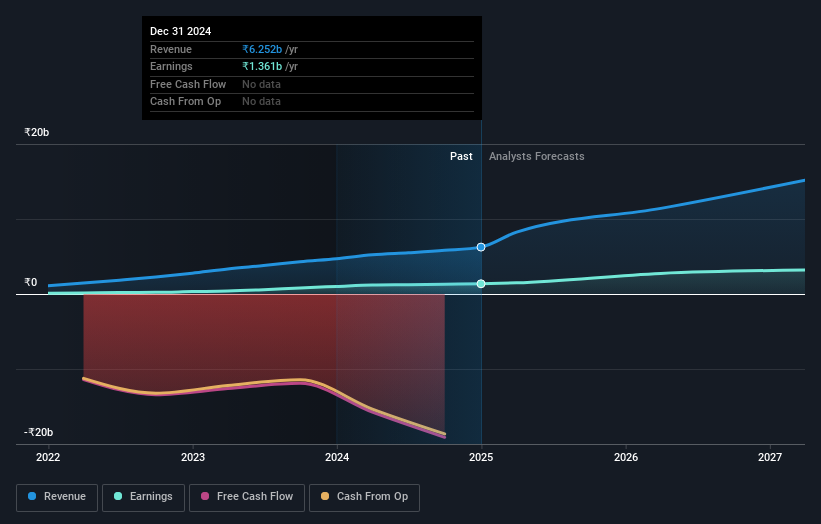- India
- /
- Capital Markets
- /
- NSEI:UGROCAP
Private companies among UGRO Capital Limited's (NSE:UGROCAP) largest shareholders, saw gain in holdings value after stock jumped 12% last week

Key Insights
- The considerable ownership by private companies in UGRO Capital indicates that they collectively have a greater say in management and business strategy
- 56% of the business is held by the top 4 shareholders
- Institutions own 22% of UGRO Capital
A look at the shareholders of UGRO Capital Limited (NSE:UGROCAP) can tell us which group is most powerful. We can see that private companies own the lion's share in the company with 34% ownership. In other words, the group stands to gain the most (or lose the most) from their investment into the company.
As a result, private companies collectively scored the highest last week as the company hit ₹17b market cap following a 12% gain in the stock.
Let's delve deeper into each type of owner of UGRO Capital, beginning with the chart below.
Check out our latest analysis for UGRO Capital

What Does The Institutional Ownership Tell Us About UGRO Capital?
Institutional investors commonly compare their own returns to the returns of a commonly followed index. So they generally do consider buying larger companies that are included in the relevant benchmark index.
As you can see, institutional investors have a fair amount of stake in UGRO Capital. This can indicate that the company has a certain degree of credibility in the investment community. However, it is best to be wary of relying on the supposed validation that comes with institutional investors. They too, get it wrong sometimes. When multiple institutions own a stock, there's always a risk that they are in a 'crowded trade'. When such a trade goes wrong, multiple parties may compete to sell stock fast. This risk is higher in a company without a history of growth. You can see UGRO Capital's historic earnings and revenue below, but keep in mind there's always more to the story.

UGRO Capital is not owned by hedge funds. Our data shows that Danish Sustainable Development Goals Investment Fund K/S is the largest shareholder with 16% of shares outstanding. The second and third largest shareholders are Clearsky Investment Holdings Pte.Limited and NewQuest Asia Investments III Limited, with an equal amount of shares to their name at 16%. Additionally, the company's CEO Shachindra Nath directly holds 2.2% of the total shares outstanding.
On looking further, we found that 56% of the shares are owned by the top 4 shareholders. In other words, these shareholders have a meaningful say in the decisions of the company.
While studying institutional ownership for a company can add value to your research, it is also a good practice to research analyst recommendations to get a deeper understand of a stock's expected performance. There are a reasonable number of analysts covering the stock, so it might be useful to find out their aggregate view on the future.
Insider Ownership Of UGRO Capital
While the precise definition of an insider can be subjective, almost everyone considers board members to be insiders. Company management run the business, but the CEO will answer to the board, even if he or she is a member of it.
Insider ownership is positive when it signals leadership are thinking like the true owners of the company. However, high insider ownership can also give immense power to a small group within the company. This can be negative in some circumstances.
We can see that insiders own shares in UGRO Capital Limited. As individuals, the insiders collectively own ₹1.0b worth of the ₹17b company. This shows at least some alignment, but we usually like to see larger insider holdings. You can click here to see if those insiders have been buying or selling.
General Public Ownership
The general public-- including retail investors -- own 31% stake in the company, and hence can't easily be ignored. While this group can't necessarily call the shots, it can certainly have a real influence on how the company is run.
Private Equity Ownership
With a stake of 7.5%, private equity firms could influence the UGRO Capital board. Some might like this, because private equity are sometimes activists who hold management accountable. But other times, private equity is selling out, having taking the company public.
Private Company Ownership
We can see that Private Companies own 34%, of the shares on issue. Private companies may be related parties. Sometimes insiders have an interest in a public company through a holding in a private company, rather than in their own capacity as an individual. While it's hard to draw any broad stroke conclusions, it is worth noting as an area for further research.
Next Steps:
I find it very interesting to look at who exactly owns a company. But to truly gain insight, we need to consider other information, too. Case in point: We've spotted 1 warning sign for UGRO Capital you should be aware of.
Ultimately the future is most important. You can access this free report on analyst forecasts for the company.
NB: Figures in this article are calculated using data from the last twelve months, which refer to the 12-month period ending on the last date of the month the financial statement is dated. This may not be consistent with full year annual report figures.
New: AI Stock Screener & Alerts
Our new AI Stock Screener scans the market every day to uncover opportunities.
• Dividend Powerhouses (3%+ Yield)
• Undervalued Small Caps with Insider Buying
• High growth Tech and AI Companies
Or build your own from over 50 metrics.
Have feedback on this article? Concerned about the content? Get in touch with us directly. Alternatively, email editorial-team (at) simplywallst.com.
This article by Simply Wall St is general in nature. We provide commentary based on historical data and analyst forecasts only using an unbiased methodology and our articles are not intended to be financial advice. It does not constitute a recommendation to buy or sell any stock, and does not take account of your objectives, or your financial situation. We aim to bring you long-term focused analysis driven by fundamental data. Note that our analysis may not factor in the latest price-sensitive company announcements or qualitative material. Simply Wall St has no position in any stocks mentioned.
About NSEI:UGROCAP
UGRO Capital
A non-banking financial company, engages in the lending business in India.
High growth potential and good value.
Similar Companies
Market Insights
Community Narratives



